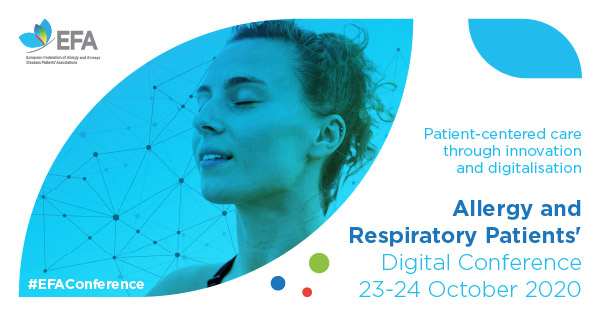Allergy and Respiratory Patients' Digital Conference

The world is undergoing a digital transition that is changing our societies and economies at an extraordinary pace. The pandemic crisis has accelerated this evolution. As part of our Capacity building programme to strengthen the allergy, asthma, and COPD patient networks, EFA held the 1st patient driven Allergy and Respiratory Patients Digital Conference on the 23-24 October 2020.
Digitalisation has the enormous potential to improve health services and patients’ self-management, by fostering the shift from disease-centred to patient-centred healthcare. It also presents challenges and opportunities in terms of patients access and equity, and ethical use of health data.
The Conference was a 2-day virtual meeting to explore the latest innovations in research and care for allergy and respiratory patients. We shed light on digitalisation as a key tool to improve the treatment and management of allergy, asthma, and COPD.
The first day welcomed 152 attendees where experts provided insight into the latest innovations and the impact of digitalisation.
The second day was reserved for EFA members, patient organisations, individual patients, and caregivers. We trained 40 participants to increase their confidence with digital skills. Two additional practical workshops allowed EFA Members the opportunity to give input on the impact of healthcare digitalisation to influence the EFA Allergy and Respiratory Patients Declaration on Patient-centred Care through digitalisation.
According to the survey conducted after the event, 84% of participants found the Conference useful. Overall, the meetings met 83% of participants’ expectations.
The speakers’ presentations and recordings from the first day are published on the website.
Meet and Greet the EU Training

In 2020 we organised our 8th annual “Meet & Greet the EU training” in the format of two virtual half-day meetings. Under the inspiring title of ‘The EU at a policy crossroads: What role for allergy, asthma, and COPD patients?’. The training aimed to increase understanding among EFA patient networks about the policies and upcoming opportunities at the EU level, such as the air quality directives, the F-Gases legislation, and the Farm-to-Fork strategy. On the first day, representatives from 15 EFA member organisations, representing 9 EU and non-EU countries, had the opportunity to hear from experts about the current trends in EU health and their impact on the EFA community.
On the second day participants from 10 EFA member organisations participated in a practical workshop where external expert consultants guided attendees on strategic tools to build an effective advocacy campaign at both national and EU levels. Revolving around the case model previously chosen by Members (Farm-To-Fork and labelling legislation), the workshop involved a lot of interaction, including a brainstorming activity and a role-playing game simulating a meeting with a Member of the European Parliament.
In the survey carried out at the end of the Meet & Greet, participants rated the presentations of the first day with 3.8 points out of 5, while they rated the practical workshop of the second day with 4.8/5.